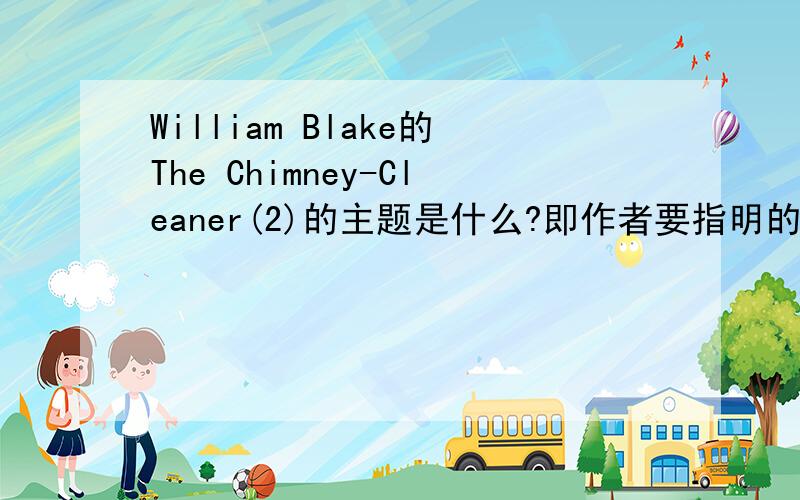William Blake的The Chimney-Cleaner(2)的主题是什么?即作者要指明的内涵.
来源:学生作业帮助网 编辑:作业帮 时间:2024/04/27 16:57:57

William Blake的The Chimney-Cleaner(2)的主题是什么?即作者要指明的内涵.
William Blake的The Chimney-Cleaner(2)的主题是什么?
即作者要指明的内涵.
William Blake的The Chimney-Cleaner(2)的主题是什么?即作者要指明的内涵.
抱歉我只知道布莱克的The Chimney Sweeper!不过你说的这个似乎和扫烟囱的小孩表达的东西是一致的.希望下文对你有帮助!
扫烟囱的小孩
当我们观赏照片或实地游览的时候,总不免对英国大城市中那一排排屋舍顶上突出的烟囱发出好奇的探问,或者为室内那以壁炉为中心所摆放的种种陈设引生温馨的遐思.为此,我们或许不知道,或许遗忘了,那曾经用以取暖的壁炉潜藏着一段悲惨的历史.壁炉中燃烧的柴火会积生一层层的煤灰,容易堵住烟囱的通道,影响空气的进出流动,因此需要常常清理.可是壁炉的空间与烟囱的通道又是那么的狭窄,那清理扫除的工作由谁来做呢?身材细小的孩童便成了劳力的主要来源.于是,清晨时分,一个个背带着清扫工具袋的孩童,沿着大街小巷叫喊着「扫烟囱!扫烟囱!」大概是十八、十九世纪英国大城市熟悉的生活场景之一.做为一般的市民,或许对于这种属于生活一部分的声音是习以为常的,我们不也曾经熟悉而且有点儿怀念那深夜中烧肉粽、烤蕃薯或臭豆腐的叫喊声?但是,做为一个文学艺术的工作者,生活中出现的种种声音不免都夹带有一些可以点染想象的故事吧!一七一一年英国作家艾迪生(Joseph Addison, 1672-1719)就曾经以「伦敦的叫卖声」为题写了一篇稍带讽谑的散文,或许可以提供一些具体而微的想象材料.相对于此,英国诗人布雷克(William Blake, 1757-1827)在一七八九年所写的〈扫烟囱的小孩〉(The Chimney Sweeper)一诗,就不只是对于喧嚷声音的一种讽谑,而是在孩子般天真的语调中含带着一份无可奈何的凄楚.
让我们先读一读这一首诗吧!(中文部分是我试的翻译)
母亲去逝的时候,我仍然非常非常的幼小
而当父亲把我卖掉时,我的嘴里也只可能喊叫
喊叫着哭泣哭泣哭泣哭泣
就这样子你家的烟囱是我清扫,而在煤灰中我睡觉.
来了个名叫汤姆•达客的小男孩,他低声哭叫
因为他那柔软如羊毛似的卷发刚被剃掉
我说:嘿汤姆,不要理会你的头发,当没了你的头发
你会知道煤灰不再可能弄脏你金黄的头发.
他安静了下来,而且就在那一夜
当汤姆沉睡时,他看到这样的一幅图像
千百个扫烟囱的小孩,狄克、乔伊、涅德与杰克
全都被深锁在一个个漆黑的棺木盒.
突地来了一位天使,带着一把明亮的钥匙
打开了棺木盒,让所有的小孩起身出来
在青翠的草原上,这些小孩尽情笑着跑着
他们沐浴在溪流中,并且在阳光下躺着晒着.
裸着身子,洁白干净,他们的工具袋抛在一旁
他们在云间跳跃,在风中嬉闹
天使告诉汤姆,如果他是一个乖小孩
上帝会是他的父亲,并且将永不欠缺喜乐.
汤姆醒了过来,我们也都在黑暗中起床
背上工具袋,带着扫把,我们一起去工作
尽管清晨是那么冷冽,汤姆却无比快乐与安详
因为只要完成工作,他们就都不再惧怕伤害.
这首诗是透过小孩的口吻叙述另一位名叫汤姆•达客的小男孩的遭遇.在此,达客的英文名字(Dacre)是与「黑色」(Dark)相谐音,自有明确的言外之意可说;同时,这首诗更以黑色的棺木暗喻扫烟囱的小孩所置身的煤灰世界,而有批评家就认为把小孩染黑的煤灰代表着人性的残酷(human cruelty).整首诗最哀婉动人的情节,莫过于达客牺牲原有的金黄柔软的卷发,以换取工作上的方便,因为光着头就不怕被煤灰弄脏,也容易清理.其次,天使的勉励劝慰也已让人感受到一丝无可奈何的凄然,因此当结尾时,扫烟囱的小孩显现出由着期待与憧憬所带来的快乐与安详,就真的让人有「人生到此,天道宁论」(江淹〈恨赋〉)的感慨了!做为阅读者,我们确切知道扫烟囱小孩最终的期待与憧憬在此世是永不可能实现的了.但是,布雷克写诗的原意并不在控诉,他只想写一种情境,一种让人为之不忍的情境.然而,诗歌艺术表现手法中,借着对比矛盾情境的经营所可能造成的「反讽」效果,就在布雷克的扫烟囱小孩这种天真素朴的语调中沉沉浮现.
布雷克的〈扫烟囱的小孩〉是与其它的诗作合刊,再加上他亲手绘制的二十七幅图板,而以《天真之歌》(Songs of Innocence)为题发行.随后,在公元一八二四年由英国另一位重要的散文作家兰姆(Charles Lamb, 1775-1834)推荐,放入当时反抗「社会不公义」的社会运动宣导手册之中,做为向国会议员游说废除童工的资料.【这一份社会运动宣导手册是由James Montgomery所编辑,题为《扫烟囱者之友》(Chimney Sweeper’s Friend and Climbing Boy’s Album),有意了解这一段社会运动的相关资料,或许可以参考.】据说扫烟囱小孩的平均年寿很短,更大多数的孩童是在畸形或肺疾的病痛中度过仅存的岁月.英国议会终于在一八四零年的八月七日通过立法废除童工制,而与「哭泣(weep)」谐音同韵的扫烟囱小孩就此正式消失在英国的大街小巷中.
剥削与压榨所形成的社会不公义,可以各种不同的形式出现,有时当我们专力注视着宏伟的建筑与数字的成长,我们或许容易忽略、或许也看不见个人身旁随处即有的不义;更有些不义是那么样的细微与细致,而让我们几乎查觉不到它们的确存在.同理,文学艺术工作者可以向我们渲染人性与文明的理性进展,也可以孤芳自赏的诉说着个人的救赎,但应该也有人可以向我们娓娓点醒不同生活中隐约可见的摧折与哭泣.于此,唐代诗人白居易(772-846)倡议「文章合为时而着,歌诗合为事而作」的创作理则或许仍有它的理想性与适用性.我们可能无法确切知悉当英国国会面对社会运动的抗争时,是否曾把参与抗争的团体或人群视为刁顽,但是我们或可想象国会议员当中有人在宴会后在深夜里的清明时刻,突地读到了布雷克的〈扫烟囱的小孩〉,而内心感受到微微一震,历史走向就此不一样了.此时此地,当我们的国会议员只有忙着与行政人员玩着相互抗争与看图识人的游戏时,我们仍否可以天真的期待与憧憬其中有人读到了诗看到了生活,而且内心感受到了微微的一震?
(原刊载于《人本教育札记》九月号)
The Chimney Sweeper: When my mother died I was very young
1When my mother died I was very young,
2And my father sold me while yet my tongue
3Could scarcely cry " 'weep! 'weep! 'weep! 'weep!"
4So your chimneys I sweep, and in soot I sleep.
5There's little Tom Dacre, who cried when his head,
6That curl'd like a lamb's back, was shav'd, so I said
7"Hush, Tom! never mind it, for when your head's bare
8You know that the soot cannot spoil your white hair."
9And so he was quiet, and that very night
10As Tom was a-sleeping, he had such a sight!
11That thousands of sweepers, Dick, Joe, Ned, and Jack,
12Were all of them lock'd up in coffins of black.
13And by came an Angel who had a bright key,
14And he open'd the coffins and set them all free;
15Then down a green plain leaping, laughing, they run,
16And wash in a river, and shine in the sun.
17Then naked and white, all their bags left behind,
18They rise upon clouds and sport in the wind;
19And the Angel told Tom, if he'd be a good boy,
20He'd have God for his father, and never want joy.
21And so Tom awoke, and we rose in the dark,
22And got with our bags and our brushes to work.
23Though the morning was cold, Tom was happy and warm;
24So if all do their duty they need not fear harm.
--------------------------------------------------------------------------------
Online text copyright © 2003, Ian Lancashire for the Department of English, University of Toronto.
Published by the Web Development Group, Information Technology Services, University of Toronto Libraries.
Original text: William Blake, Songs of Innocence (1789). Blake's Illuminated Books, ed. David Bindman (Princeton, NJ: William Blake Trust; London: Tate Gallery, 1991-). See Vol. 2. PR 4142 B46 1991 ROBA.
First publication date: 1789
RPO poem editor: Northrop Frye
RP edition: 3RP 2.279.
Recent editing: 4:2002/3/14
Rhyme: aabb
-----
The Chimney Sweeper: A little black thing among the snow
1A little black thing among the snow,
2Crying "weep! 'weep!" in notes of woe!
3"Where are thy father and mother? say?"
4"They are both gone up to the church to pray.
5Because I was happy upon the heath,
6And smil'd among the winter's snow,
7They clothed me in the clothes of death,
8And taught me to sing the notes of woe.
9And because I am happy and dance and sing,
10They think they have done me no injury,
11And are gone to praise God and his Priest and King,
12Who make up a heaven of our misery."
William Blake
【作者简介】
威廉·布莱克(William Blake 1757—1827),生于伦敦一个袜商之家,少年时家境贫寒,未有就学机会,十四岁开始当雕版学徒,后即靠雕刻版画为生.平生写诗甚多,其代表作有《天真之歌》(Songs of Innocence)和《经验之歌》(Songs of Experience)等.他的诗歌富有民主思想,揭露了当时英国社会的罪恶和不人正现象,表现了他对穷苦不幸者的深切同情.
London
I wander thro’ each charter’d street,
Near where the charter’d Thames does flow,
And mark in every face I meet
Marks of weakness, marks of woe.
In every cry of every Man,
In every Infant’s cry of fear,
In every voice, in every ban,
The mind-forg’d manacles I hear.
How the Chimney-sweeper’s cry
Every black’ning Church appalls;
And the hapless Soldier’s sigh
Runs in blood down Palace walls.
But most thro’ midnight streets I hear
How the youthful harlot’s curse
Blasts the new born Infant’s tear,
And blights with plagues the Marriage hearse.
【译文】
伦敦
我沿着被独占的泰晤干河旁,
徘徊在每一条被独占的街上,
我看见每一张脸孔
都是一片饥色,一副哭相.
从每一个大人的呼叫,
从每一个婴儿的嚎啕,
从每一个声音、每一条禁令,
我都听到人为的镣铐.
清扫烟囱的孩子们的哭嚷,
惊动着每一座污黑的教堂;
伤兵们的叹息有如鲜血,
从王宫的高墙直往下淌.
最不忍心在夜半的街头,
听见年轻妓女的诅咒,
那诅咒能把新生婴儿吓得不也啼哭,
那诅咒如同瘟疫,能使婚车变成灵枢.